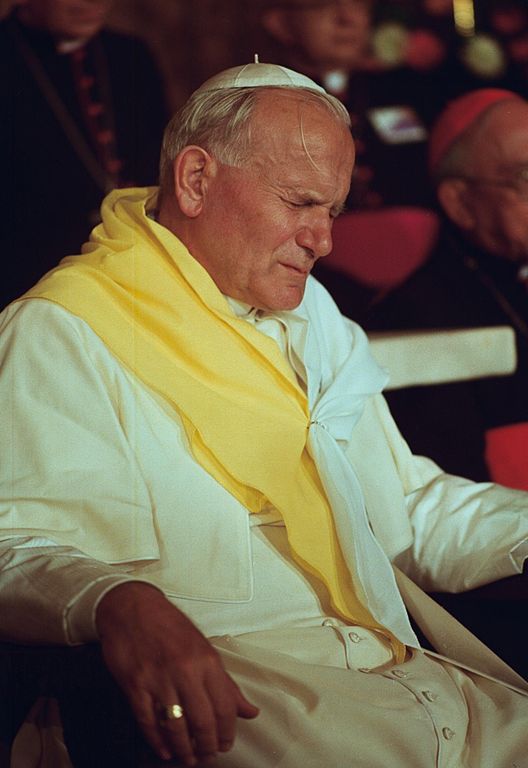
Pope St. John Paul II in Cali, Colombia (June 1986) [Wikimedia Commons / Creative Commons Attribution 2.0 Generic license]
*****
(compiled by Dave Armstrong on 12-26-05)
*****
PONTIFICAL COUNCIL FOR SOCIAL COMMUNICATIONS:
The Church and Internet (link)
22 February 2002
[for all three sources below: footnotes removed: consult the link for further documentation]
1. . . . Quoting Pope Pius XII’s 1957 encyclical letter Miranda Prorsus, the Pastoral Instruction on the Means of Social Communication Communio et Progressio, published in 1971, underlined that point: “The Church sees these media as ‘gifts of God’ which, in accordance with his providential design, unite men in brotherhood and so help them to cooperate with his plan for their salvation”. This remains our view, and it is the view we take of the Internet.
[ . . . ]
4. Three decades ago Communio et Progressio pointed out that “modern media offer new ways of confronting people with the message of the Gospel”. Pope Paul VI said the Church “would feel guilty before the Lord” if it failed to use the media for evangelization. Pope John Paul II has called the media “the first Areopagus of the modern age”, and declared that “it is not enough to use the media simply to spread the Christian message and the Church’s authentic teaching. It is also necessary to integrate that message into the ‘new culture’ created by modern communications”. Doing that is all the more important today, since not only do the media now strongly influence what people think about life but also to a great extent “human experience itself is an experience of media”.
All this applies to the Internet. And even though the world of social communications “may at times seem at odds with the Christian message, it also offers unique opportunities for proclaiming the saving truth of Christ to the whole human family. Consider…the positive capacities of the Internet to carry religious information and teaching beyond all barriers and frontiers. Such a wide audience would have been beyond the wildest imaginings of those who preached the Gospel before us…Catholics should not be afraid to throw open the doors of social communications to Christ, so that his Good News may be heard from the housetops of the world”.
[this paragraph’s citation from: John Paul II, Message for the 35th World Communications Day, n. 3, May 27, 2001]
[ . . . ]
5. . . . Since announcing the Good News to people formed by a media culture requires taking carefully into account the special characteristics of the media themselves, the Church now needs to understand the Internet. This is necessary in order to communicate effectively with people—especially young people—who are steeped in the experience of this new technology, and also in order to use it well.
. . . The Internet is relevant to many activities and programs of the Church— evangelization, including both re-evangelization and new evangelization and the traditional missionary work ad gentes, catechesis and other kinds of education, news and information, apologetics, governance and administration, and some forms of pastoral counseling and spiritual direction. Although the virtual reality of cyberspace cannot substitute for real interpersonal community, the incarnational reality of the sacraments and the liturgy, or the immediate and direct proclamation of the gospel, it can complement them, attract people to a fuller experience of the life of faith, and enrich the religious lives of users. It also provides the Church with a means for communicating with particular groups—young people and young adults, the elderly and home-bound, persons living in remote areas, the members of other religious bodies—who otherwise may be difficult to reach.
. . . Church-related groups that have not yet taken steps to enter cyberspace are encouraged to look into the possibility of doing so at an early date. We strongly recommend the exchange of ideas and information about the Internet among those with experience in the field and those who are newcomers.
[ . . . ]
10. . . . It is important, too, that people at all levels of the Church use the Internet creatively to meet their responsibilities and help fulfill the Church’s mission. Hanging back timidly from fear of technology or for some other reason is not acceptable, in view of the very many positive possibilities of the Internet. “Methods of facilitating communication and dialogue among her own members can strengthen the bonds of unity between them. Immediate access to information makes it possible for [the Church] to deepen her dialogue with the contemporary world…The Church can more readily inform the world of her beliefs and explain the reasonsfor her stance on any given issue or event. She can hear more clearly the voice of public opinion, and enter into a continuous discussion with the world around her, thus involving herself more immediately in the common search for solutions to humanity’s many pressing problems”.
[John Paul II, Message for the 24th World Communications Day, 1990]
[ . . . ]
11. . . . To educators and catechists. The Pastoral Instruction Communio et Progressio spoke of the “urgent duty” of Catholic schools to train communicators and recipients of social communications in relevant Christian principles. The same message has been repeated many times. In the age of the Internet, with its enormous outreach and impact, the need is more urgent than ever.
Catholic universities, colleges, schools, and educational programs at all levels should provide courses for various groups—“seminarians, priests, religious brothers and sisters, and lay leaders…teachers, parents, and students” —as well as more advanced training in communications technology, management, ethics, and policy issues for individuals preparing for professional media work or decision-making roles, including those who work in social communications for the Church. Furthermore, we commend the issues and questions mentioned above to the attention of scholars and researchers in relevant disciplines in Catholic institutions of higher learning.
[ . . . ]
12. . . . Fortitude, courage, is necessary. This means standing up for truth in the face of religious and moral relativism, for altruism and generosity in the face of individualistic consumerism, for decency in the face of sensuality and sin.
And temperance is needed—a self-disciplined approach to this remarkable technological instrument, the Internet, so as to use it wisely and only for good.
PONTIFICAL COUNCIL FOR SOCIAL COMMUNICATIONS
Ethics in Internet (link)
22 February 2002
1. . . . The new media are powerful tools for education and cultural enrichment, for commercial activity and political participation, for intercultural dialogue and understanding; and, as we point out in the document that accompanies this one, they also can serve the cause of religion. Yet this coin has another side. Media of communication that can be used for the good of persons and communities can be used to exploit, manipulate, dominate, and corrupt.
[ . . . ]
2. . . . In this document we wish to set out a Catholic view of the Internet, as a starting point for the Church’s participation in dialogue with other sectors of society, especially other religious groups, concerning the development and use of this marvelous technological instrument. The Internet is being put to many good uses now, with the promise of many more, but much harm also can be done by its improper use. Which it will be, good or harm, is largely a matter of choice—a choice to whose making the Church brings two elements of great importance: her commitment to the dignity of the human person and her long tradition of moral wisdom.
[ . . . ]
9. . . . The Internet can unite people, but it also can divide them, both as individuals and as mutually suspicious groups separated by ideology, politics, possessions, race and ethnicity, intergenerational differences, and even religion.
[ . . . ]
12. The question of freedom of expression on the Internet is similarly complex and gives rise to another set of concerns.
We strongly support freedom of expression and the free exchange of ideas. Freedom to seek and know the truth is a fundamental human right, and freedom of expression is a cornerstone of democracy.
[ . . . ]
13. . . . The Internet is a highly effective instrument for bringing news and information rapidly to people. But the economic competitiveness and round-the-clock nature of Internet journalism also contribute to sensationalism and rumor-mongering, to a merging of news, advertising, and entertainment, and to an apparent decline in serious reporting and commentary. Honest journalism is essential to the common good of nations and the international community. Problems now visible in the practice of journalism on the Internet call for speedy correcting by journalists themselves.
. . . While Internet users have a duty to be selective and self-disciplined, that should not be carried to the extreme of walling themselves off from others. The medium’s implications for psychological development and health likewise need continued study, including the possibility that prolonged immersion in the virtual world of cyberspace may be damaging to some. Although there are many advantages in the capacity technology gives people to “assemble packages of information and services uniquely designed for them”, this also “raises an inescapable question: Will the audience of the future be a multitude of audiences of one?…What would become of solidarity—what would become of love—in a world like that?”
[Pontifical Council for Social Communications, Ethics in Communications, n.29]
[ . . . ]
18. As we pointed out above, a companion document to this one called The Church and Internet speaks specifically about the Church’s use of the Internet and the Internet’s role in the life of the Church. Here we wish only to emphasize that the Catholic Church, along with other religious bodies, should have a visible, active presence on the Internet and be a partner in the public dialogue about its development. “The Church does not presume to dictate these decisions and choices, but it does seek to be of help by indicating ethical and moral criteria which are relevant to the process—criteria which are to be found in both human and Christian values”.
[Pontifical Council for Social Communications, Pastoral Instruction Aetatis Novae on Social Communications on the twentieth anniversary of Communio et progressio, n.12]
. . . The Church cannot impose answers, but she can—and must—proclaim to the world the answers she has received; and today, as always, she offers the one ultimately satisfying answer to the deepest questions of life—Jesus Christ, who “fully reveals man to himself and brings to light his most high calling”. Like today’s world itself, the world of media, including the Internet, has been brought by Christ, inchoately yet truly, within the boundaries of the kingdom of God and placed in service to the word of salvation.
APOSTOLIC LETTER
The Rapid Development [link]
OF THE HOLY FATHER JOHN PAUL II TO THOSE RESPONSIBLE FOR COMMUNICATIONS
24 January 2005, the Feast of Saint Francis de Sales, Patron Saint of Journalists
1. The rapid development of technology in the area of the media is surely one of the signs of progress in today’s society. In view of these innovations in continuous evolution, the words found in the Decree of the Second Vatican Ecumenical Council, Inter Mirifica, promulgated by my venerable predecessor, the servant of God Paul VI, December 4, 1963, appear even more pertinent: “Man’s genius has with God’s help produced marvelous technical inventions from creation, especially in our times. The Church, our mother, is particularly interested in those which directly touch man’s spirit and which have opened up new avenues of easy communication of all kinds of news, of ideas and orientations.”
2. . . . In fact, the Church is not only called upon to use the mass media to spread the Gospel but, today more than ever, to integrate the message of salvation into the “new culture” that these powerful means of communication create and amplify. It tells us that the use of the techniques and the technologies of contemporary communications is an integral part of its mission in the third millennium.
Moved by this awareness, the Christian community has taken significant steps in the use of the means of communication for religious information, for evangelization and catechesis, for the formation of pastoral workers in this area, and for the education to a mature responsibility of the users and the recipients of the various communications media.
[ . . . ]
5. The communication between God and humanity has thus reached its perfection in the Word made flesh. The act of love by which God reveals himself, united to the response of faith by humanity, generates a fruitful dialogue. Precisely for this reason, making our own in a certain sense the request of the disciples, “teach us to pray” (Lk11:1), we can ask the Lord to help us to understand how to communicate with God and with other human beings through the marvelous communications media. In light of so decisive and definitive a communication, the media provide a providential opportunity to reach people everywhere, overcoming barriers of time, of space and of language; presenting the content of faith in the most varied ways imaginable; and offering to all who search the possibility of entering into dialogue with the mystery of God, revealed fully in Christ Jesus.
The Incarnate Word has left us an example of how to communicate with the Father and with humanity, whether in moments of silence and recollection, or in preaching in every place and in every way. He explains the Scriptures, expresses himself in parables, dialogues within the intimacy of the home, speaks in the squares, along the streets, on the shores of the lake and on the mountaintops.
[ . . . ]
6. . . . the Church takes advantage of the opportunities offered by the communications media as pathways providentially given by God to intensify communion and to render more penetrating the proclamation of His word. . . . We give thanks to God for the presence of these powerful media which, if used by believers with the genius of faith and in docility to the light of the Holy Spirit, can facilitate the communication of the Gospel and render the bonds of communion among ecclesial communities more effective.
7. In the communications media the Church finds a precious aid for spreading the Gospel and religious values, for promoting dialogue, ecumenical and inter-religious cooperation, and also for defending those solid principles which are indispensable for building a society which respects the dignity of the human person and is attentive to the common good. The Church willingly employs these media to furnish information about itself and to expand the boundaries of evangelization, of catechesis and of formation, considering their use as a response to the command of the Lord: “Go into the whole world and proclaim the gospel to every creature” (Mk 16:15). . . .
8. The appreciation of the media is not reserved only to those already adept in the field, but to the entire Church Community. If, as has already been noted, the communications media take into account different aspects of the expression of faith, Christians must take into account the media culture in which they live: from the Liturgy, the fullest and fundamental expression of communication with God and with one another, to Catechesis, which cannot prescind from the fact of being directed to people immersed in the language and the culture of the day.
[ . . . ]
9. . . . New technologies, in particular, create further opportunities for communicationunderstood as a service to the pastoral government and organization of the different tasks of the Christian community . . . Many Christians are already creatively using this instrument, exploring its potential to assist in the tasks of evangelization and education, as well as of internal communication, administration and governance.
[ . . . ]
11. . . . a vast work of formation is needed to assure that the mass media be known and used intelligently and appropriately. The new vocabulary they introduce into society modifies both learning processes and the quality of human relations, so that, without proper formation, these media run the risk of manipulating and heavily conditioning, rather than serving people. This is especially true for young people, who show a natural propensity towards technological innovations, and as such are in even greater need of education in the responsible and critical use of the media.
. . . Finally, there cannot be forgotten the great possibilities of mass media in promoting dialogue, becoming vehicles for reciprocal knowledge, of solidarity and of peace. They become a powerful resource for good if used to foster understanding between peoples . . .
12. . . . While it is true that the truths of the faith are not open to arbitrary interpretations, and that respect for the rights of others places intrinsic limits upon the expression of one’s judgments, it is no less true that there is still room among Catholics for an exchange of opinions in a dialogue which is respectful of justice and prudence.
. . . This communication must tend towards a constructive dialogue, . . . This is one of the areas in which collaboration between the lay faithful and Pastors is most needed, as the Council appropriately emphasized, “A great many wonderful things are to be hoped for from this familiar dialogue between the laity and their spiritual leaders: in the laity a strengthened sense of personal responsibility; a renewed enthusiasm; a more ready application of their talents to the projects of their spiritual leaders. The latter, on the other hand, aided by the experience of the laity, can more clearly and more incisively come to decisions regarding both spiritual and temporal matters. In this way, the whole Church, strengthened by each one of its members, may more effectively fulfill its mission for the life of the world”.
[Second Vatican Ecumenical Council, Lumen Gentium, 37]
13. . . . Everyone should know how to foster an attentive discernment and constant vigilance, developing a healthy critical capacity regarding the persuasive force of the communications media . . . The modern technologies increase to a remarkable extent the speed, quantity and accessibility of communication, but they above all do not favor that delicate exchange which takes place between mind and mind, between heart and heart, and which should characterize any communication at the service of solidarity and love.
[ . . . ]
14. The apostle Paul has a clear message for those engaged in communications (politicians, professional communicators, spectators), “Therefore, putting away falsehood, speak the truth, each one to his neighbor, for we are members one of another… No foul language should come out of your mouths, but only such as is good for needed edification, that it may impart grace to those who hear” (Eph 4: 25, 29).
To those working in communication, especially to believers involved in this important field of society, I extend the invitation which, from the beginning of my ministry as Pastor of the Universal Church, I have wished to express to the entire world “Do not be afraid!”
Do not be afraid of new technologies! These rank “among the marvelous things” – inter mirifica– which God has placed at our disposal to discover, to use and to make known the truth, also the truth about our dignity and about our destiny as his children, heirs of his eternal Kingdom.
Do not be afraid of being opposed by the world! Jesus has assured us, “I have conquered the world!” (Jn 16:33) . . .













